A flotilla of 'little ships' that evacuated Allied troops from the beaches of Dunkirk set sail for France this morning to commemorate the 75th anniversary of the pivotal Second World War operation.
The ramshackle fleet of some 50 yachts, fishing boats and life boats have set sail from Ramsgate in Kent for the French port, recreating a journey that saw them save the lives of more than 300,000 British, French and Belgian troops.
Hundreds of well-wishers lined the harbour walls as the boats made their way out on to calm seas beyond the breakwater, whooping and cheering as those aboard waved back.
A piper played by the lighthouse as boats such as Aureol, L'Orage and Chumley - names that have gone down in history for the role they played in the operation - sailed out of the port. And standards were lowered as a mark of respect for those who did not return.
The return to Dunkirk: Flotilla of 50 'little ships' make journey from south coast to French port 75 years on from the evacuation that rescued 300,000 Allied troops
Fleet of 'little ships' that evacuated soldiers from Dunkirk in WWII are returning to France to mark 75th anniversary
Some 50 vessels set sail from Kent to recreate journey that saw them save more than 300,000 Allied lives
Veterans are among those crossing the Channel for commemorations of the mission, dubbed 'Operation Dynamo'
By Stephanie Linning for MailOnline
21 May 2015
Daily Mail
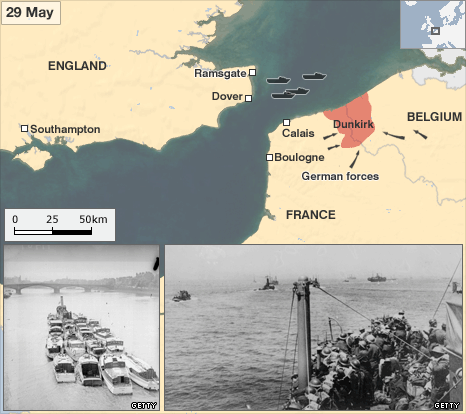
The 'little ships' are making the same journey from Ramsgate to Dunkirk as they made 75 years ago
A flotilla of 'little ships' that evacuated Allied troops from the beaches of Dunkirk set sail for France this morning to commemorate the 75th anniversary of the pivotal Second World War operation.
The ramshackle fleet of some 50 yachts, fishing boats and life boats have set sail from Ramsgate in Kent for the French port, recreating a journey that saw them save the lives of more than 300,000 British, French and Belgian troops.
Hundreds of well-wishers lined the harbour walls as the boats made their way out on to calm seas beyond the breakwater, whooping and cheering as those aboard waved back.
A piper played by the lighthouse as boats such as Aureol, L'Orage and Chumley - names that have gone down in history for the role they played in the operation - sailed out of the port. And standards were lowered as a mark of respect for those who did not return.
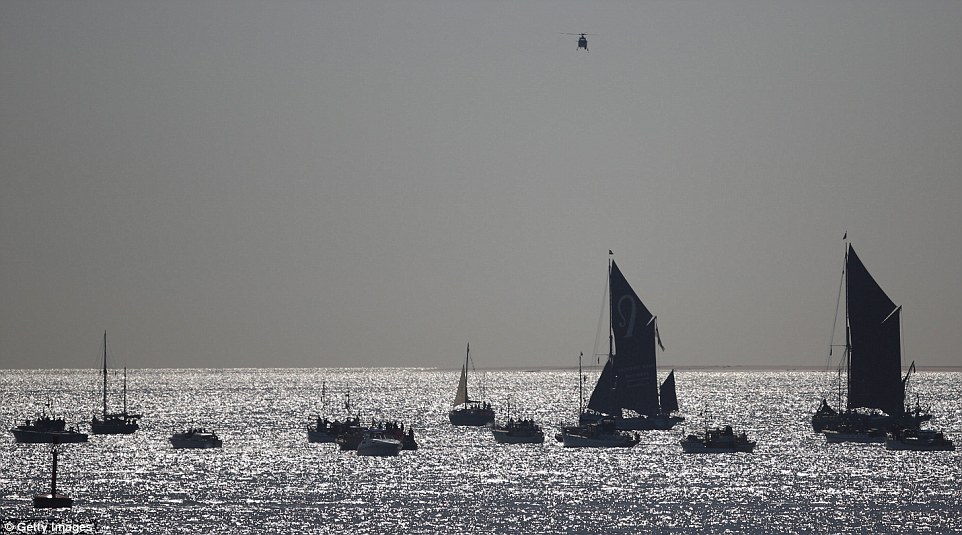 Poignant: Some 50 yachts, fishing boats and life boats set sail from Ramsgate in Kent this morning, commemorating one of the pivotal missions of the Second World War
Poignant: Some 50 yachts, fishing boats and life boats set sail from Ramsgate in Kent this morning, commemorating one of the pivotal missions of the Second World War
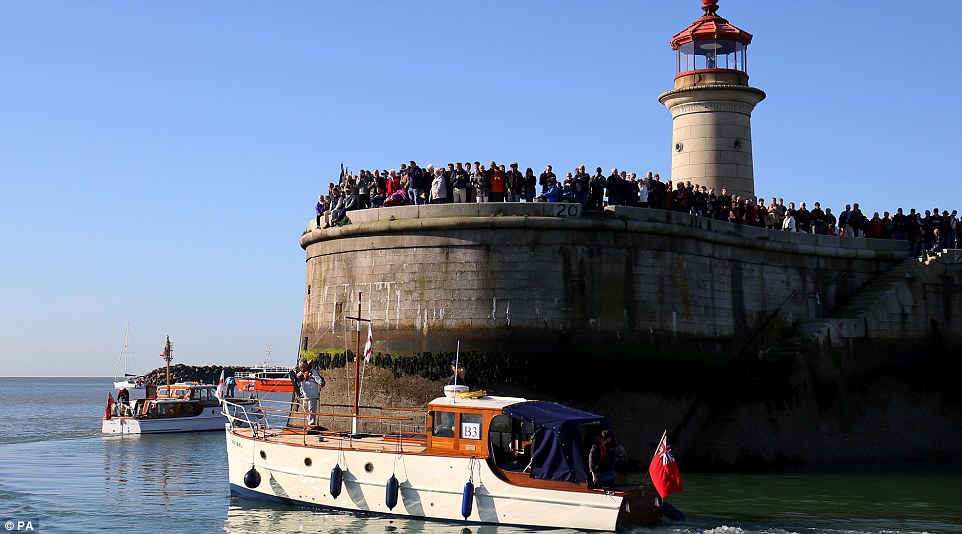
Setting sail: Hundreds of well-wishers gathered as a marching band paraded through the streets, and a piper played at the lighthouse
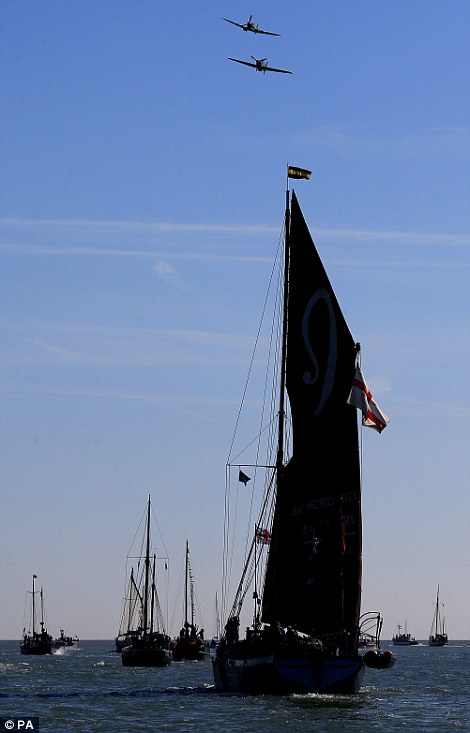
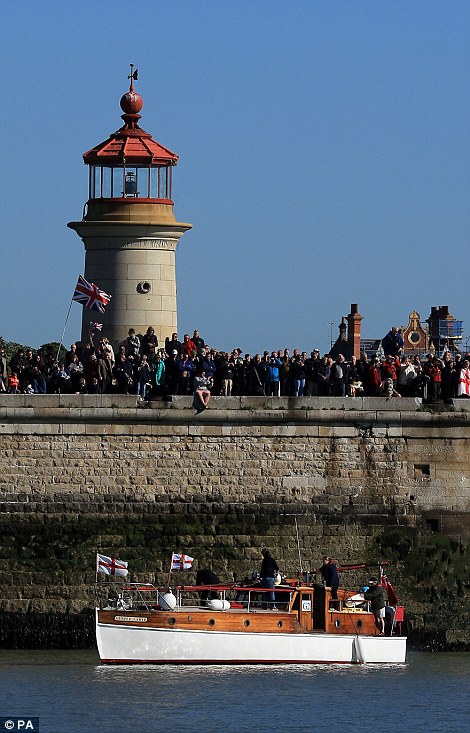
Support: A Spitfire and a Hurricane fighter plane performed a military fly-past, echoing the air support the RAF gave to her naval colleagues
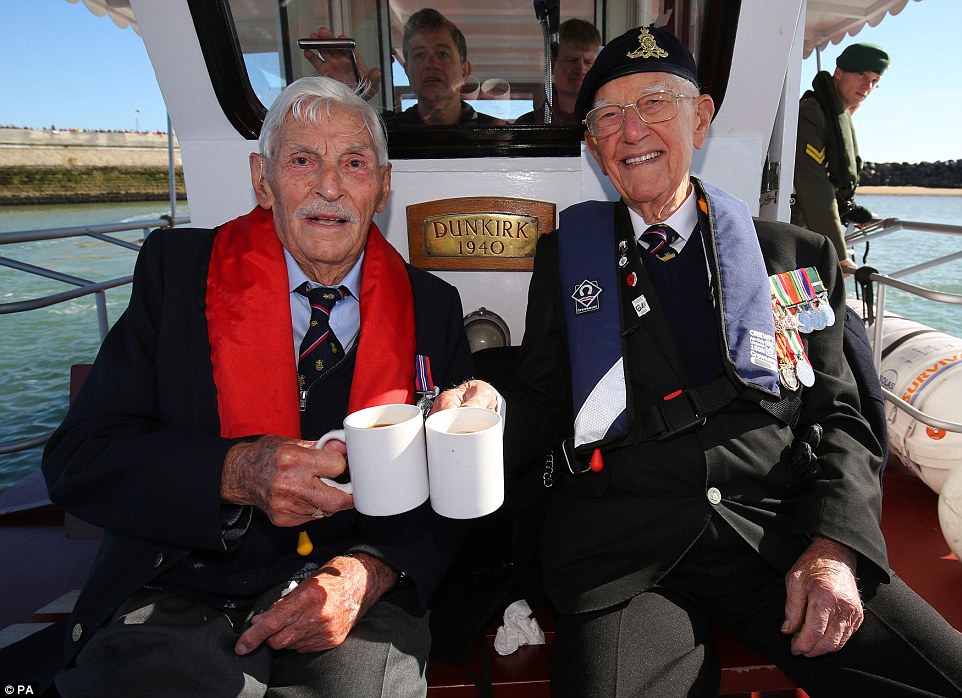
Remembering their journey: Dunkirk veterans Michael Bentall, 94, (left) and 95-year-old Garth Wright enjoy a cuppa on board the Princess Freda
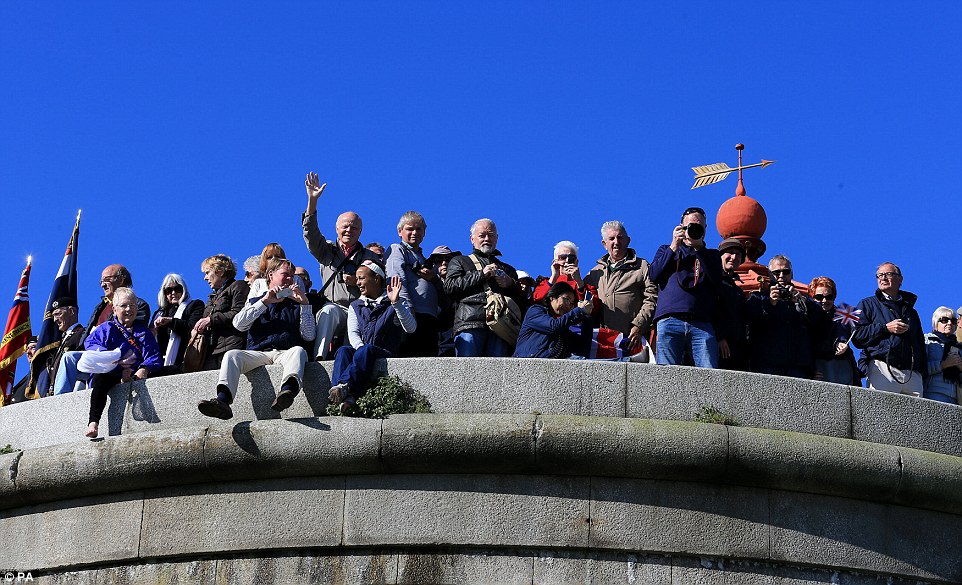
Send off: Members of the public watch and wave as the 'little ships' leave Ramsgate Harbour in Kent to set sail for Dunkirk, France
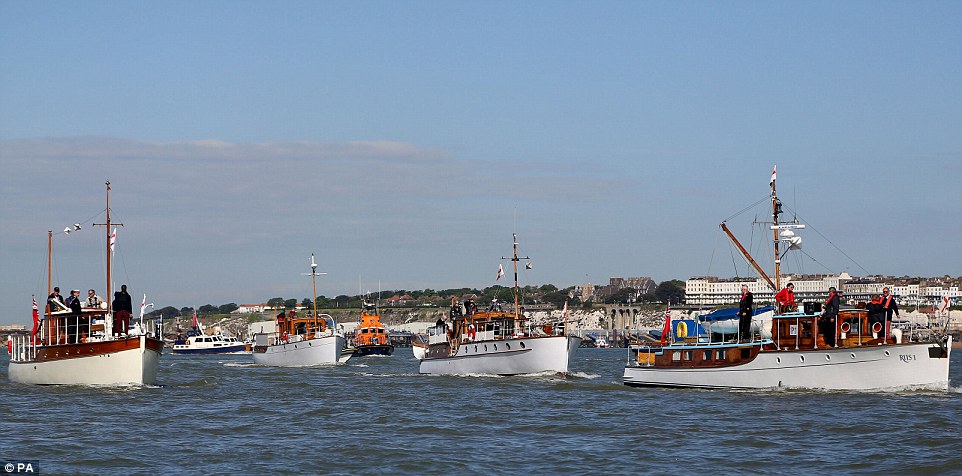
Commemoration: The fleet of 'little ships' set sail from Ramsgate in Kent for Dunkirk to mark the 75th anniversary of the evactuation
A Spitfire and a Hurricane fighter plane performed a military fly-past, a touching salute that echoed the air support the RAF gave to her naval colleagues as they desperately tried to rescue men from the beaches.
Aboard one little ship, the Thames passenger vessel Princess Freda, were Dunkirk veterans Garth Wright, 95, from Plymouth, and 94-year-old Michael Bentall, who came over from Canada for the anniversary. Mr Wright said he was impressed by the number of boats taking part in the event.
He said: 'This is a great occasion. They are making much more of it than I thought it was going to be. I have been back a number of times over the years, but I have never experienced the importance like this one is.
'I think it is the little ships that have contributed to the effect of it all. Seeing them all, it is an inspiring and thrilling sight.'
Around 10 other veterans are expected to attend a series of commemorative events at Dunkirk over the coming days.
RETRACING THEIR JOURNEY: TWO VETERANS, AGED 94 AND 95, RETURN TO DUNKIRK TO REMEMBER THE FALLEN
Two veterans of the Dunkirk evacuations will cross the Channel on the Princess Freda, a 63ft Thames passenger vessel that ferried soldiers off the beaches to a waiting navy destroyer.
Garth Wright, 95, from Plymouth, said he was impressed by the number of boats taking part in the event.
He said: 'This is a great occasion. They are making much more of it than I thought it was going to be. I have been back a number of times over the years, but I have never experienced the importance like this one is.
'I think it is the little ships that have contributed to the effect of it all. Seeing them all, it is an inspiring and thrilling sight.'
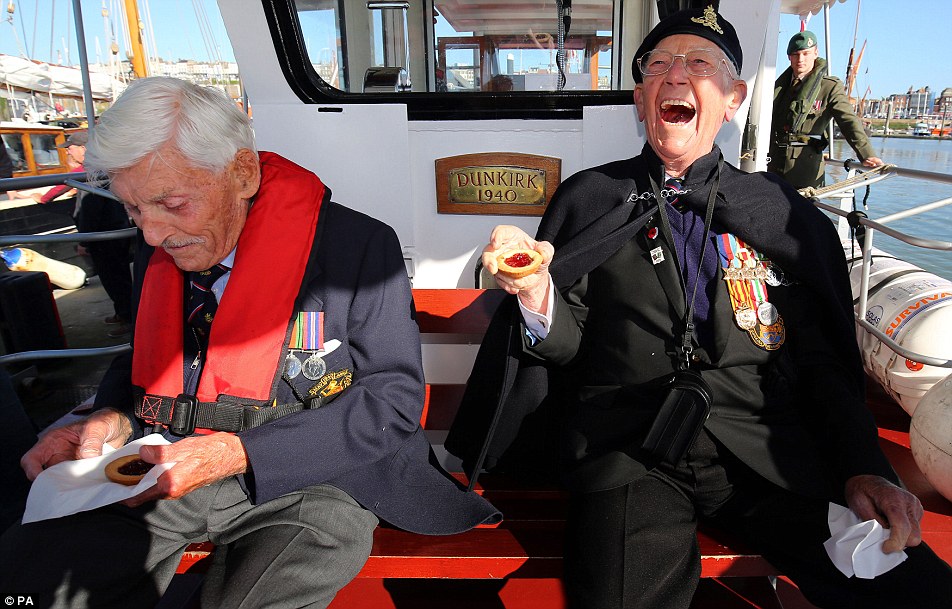 Lighthearted moment: Mr Bentall, left, and Mr Wright, enjoy sweet tarts embark on the journey to Dunkirk - 75 years after they were evacuated
Lighthearted moment: Mr Bentall, left, and Mr Wright, enjoy sweet tarts embark on the journey to Dunkirk - 75 years after they were evacuated
Mr Wright is taking the journey with 94-year-old Michael Bentall, who came over from Canada for the anniversary. Mr Bentall served with the 4th Battalion, Royal Berkshire Regiment, which was part of the British Expeditionary Force.
As the Germans advanced, he fled 120 miles towards the coast, reaching the beach somewhere between Dunkirk and La Panne.
He and his comrades found a rowing boat and headed out into the Channel, where they were eventually rescued and returned to safety in Sheerness, Kent, some time around June 4 1940.
Some 10 other veterans are expected to attend a series of commemorative events at Dunkirk over the coming days.
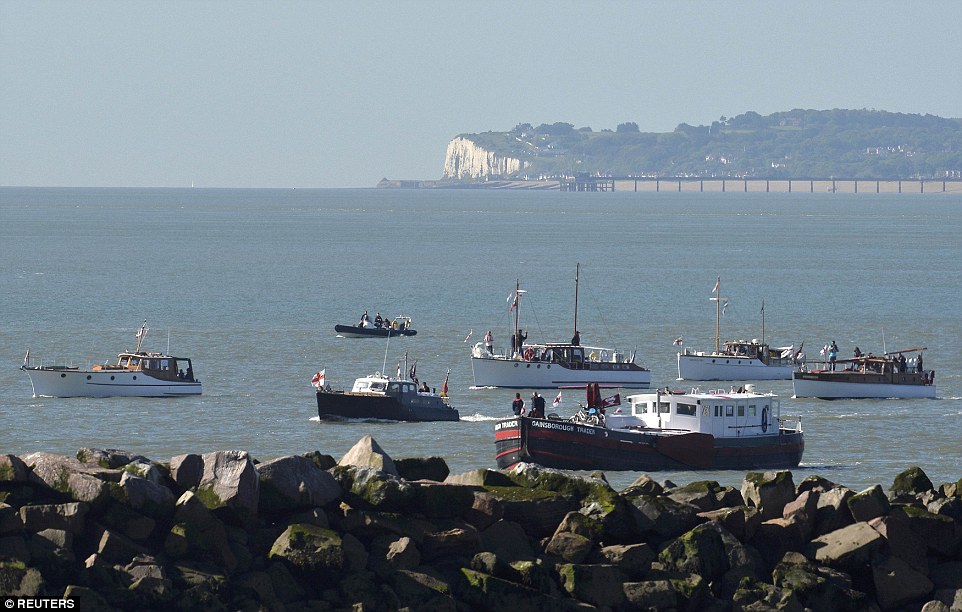
Scenic: Under clear skies, the little ships pass the White Cliffs of Dover as they make their way towards Dunkirk on the French coast
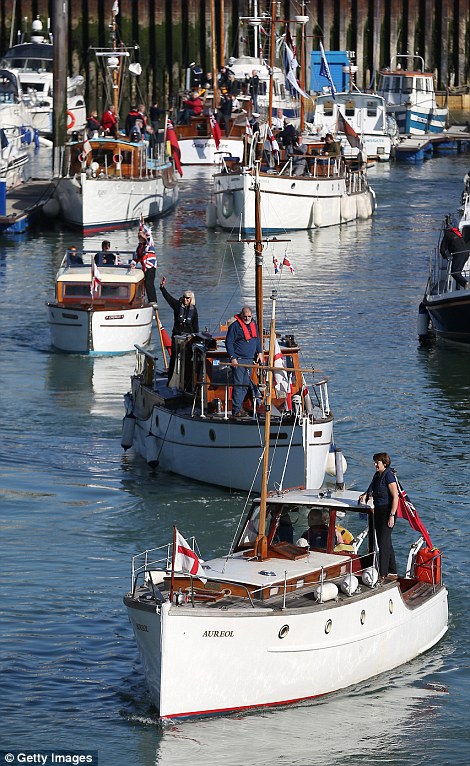
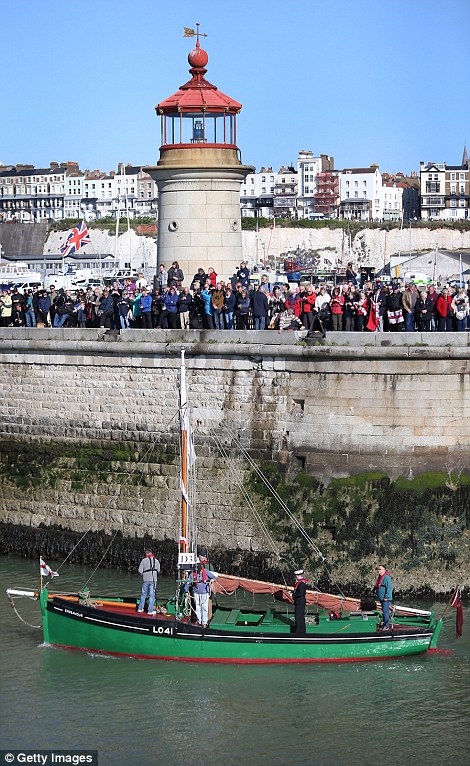
Well-wishers lined the harbour walls as the boats made their way out on to calm seas, whooping and cheering as those aboard waved back
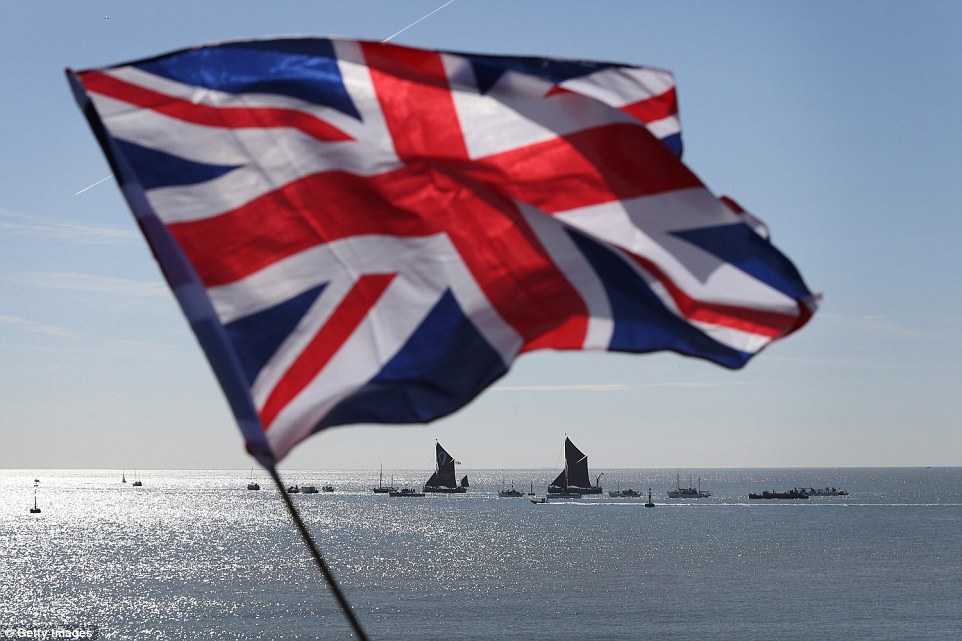 Breathtaking: A Union flag blows in the wind as little ships are seen heading out into open water from the English coast
Breathtaking: A Union flag blows in the wind as little ships are seen heading out into open water from the English coast
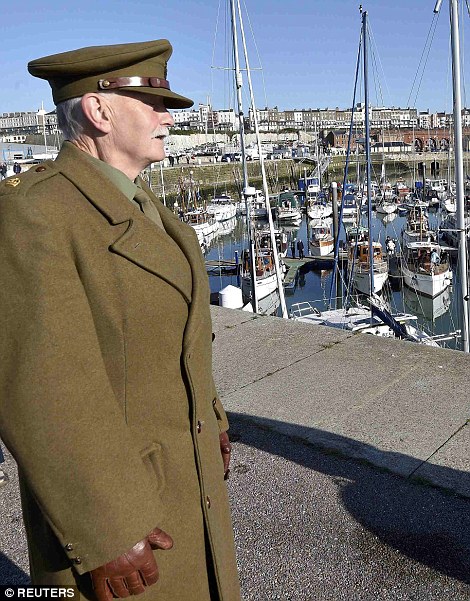
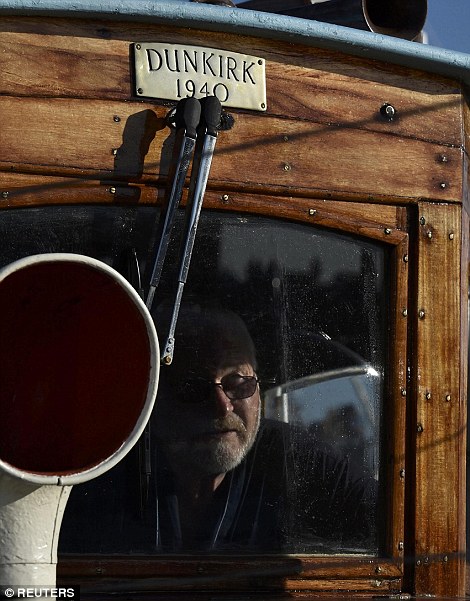
Taking part: A re-enactor in period costume looks out over Ramsgate harbour, left, and sailor Alan Jackson looks out from his boat at dawn
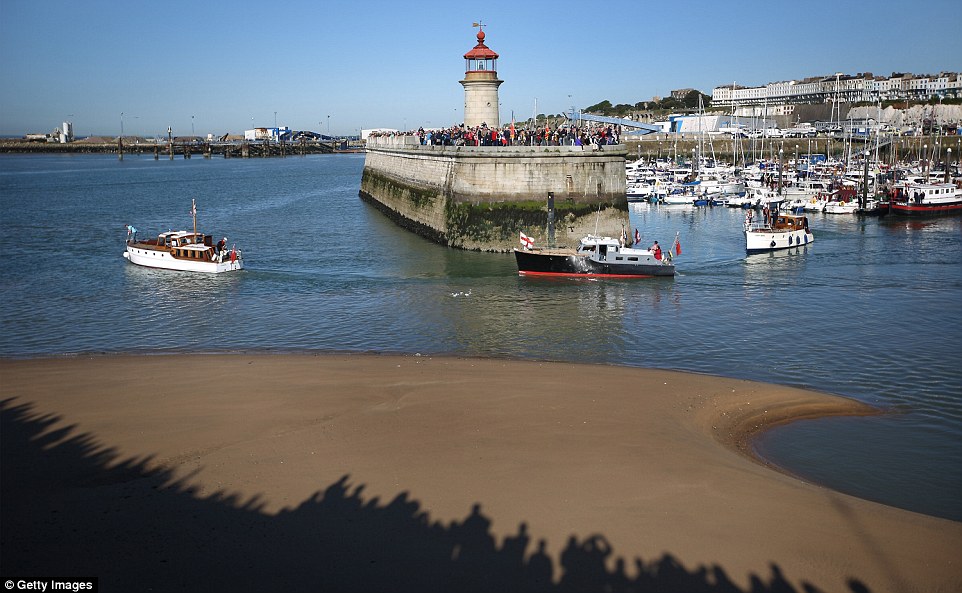
The shadows of hundreds of people are seen on the shore as the fleet makes its way past the harbour walls in Ramsgate, Kent
Hundreds of vessels crossed the Channel between May 27 and June 4 1940, with fishing boats, pleasure yachts and lifeboats pressed into service to rescue soldiers who had been forced back to the coast in the face of the German advance across Europe.
The evacuation, known as Operation Dynamo, saw an estimated 338,000 troops rescued from northern France. Described as a 'miracle of deliverance' by wartime prime minister Winston Churchill, it is seen as one of several events in 1940 that determined the eventual outcome of the war.
The Association of Dunkirk Little Ships (ADLS) is being escorted across the Channel for the anniversary by the RNLI and the Royal Navy boats HMS Ranger and HMS Trumpeter - on board which is Prince Michael of Kent, the ADLS's honorary Admiral.
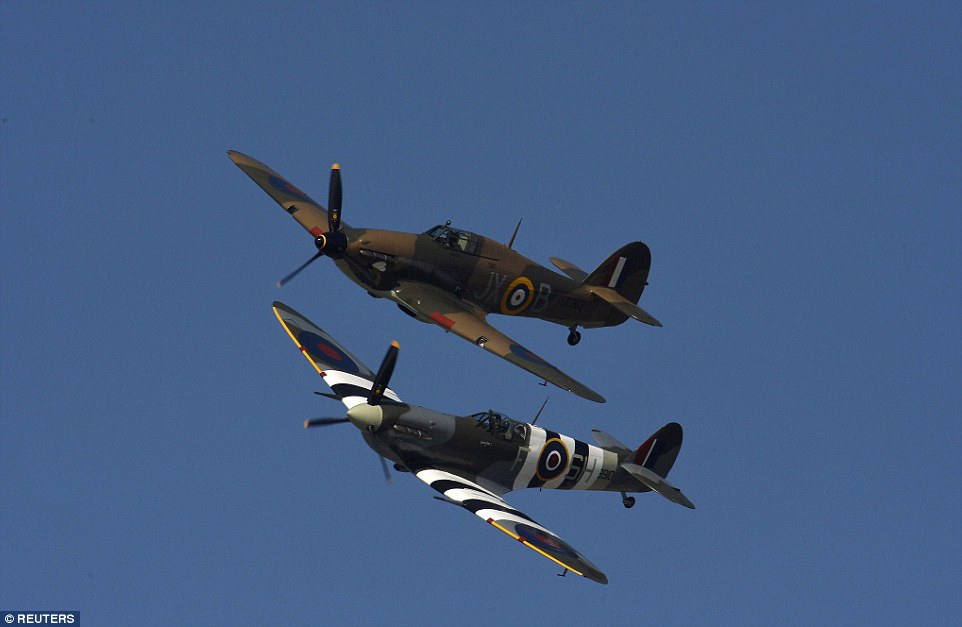
A Spitfire and a Hurricane fighter plane performed a military fly-past, a touching salute to the air support the RAF gave during the operation
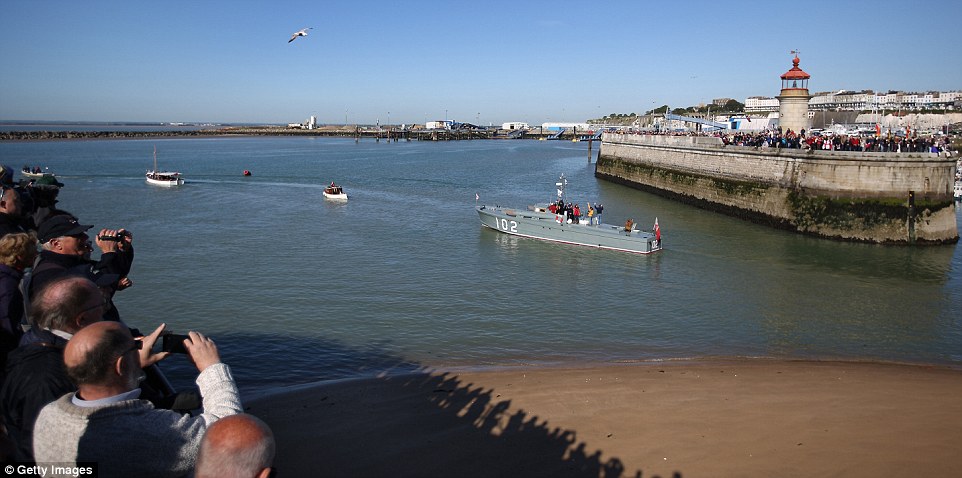
The little ships are being escorted across the Channel by the RNLI and the Royal Navy boats HMS Ranger and HMS Trumpeter
Tomorrow there will be a service at the British Memorial at the Dunkirk Military Cemetery, followed by a reception and presentation for ADLS skippers at the Dunkirk town hall.
The main event to mark the historic rescue mission will be on Saturday, when an official service will take place at the Allied Beach Memorial. Later that day there will be a parade of military vehicles and bands through the streets of Dunkirk.
On Sunday a memorial plaque will be unveiled at the site of the MV Crested Eagle, a paddle steamer which was attacked and sank with 300 soldiers on board.
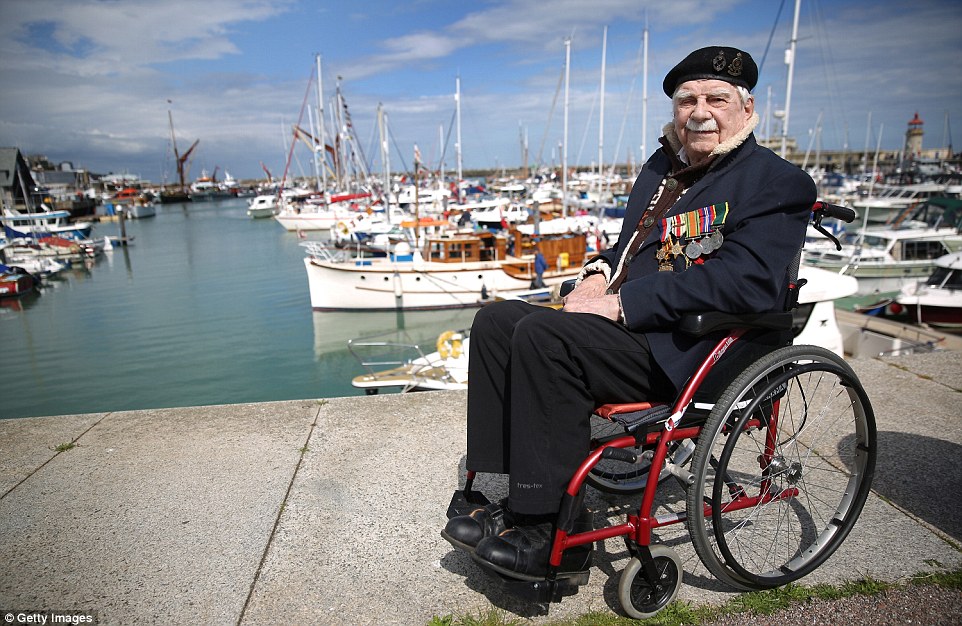
Paying tribute: Ted Oates, a veteran of the Dunkirk mission, is pictured in Ramsgate yesterday, when the commemoratory events began
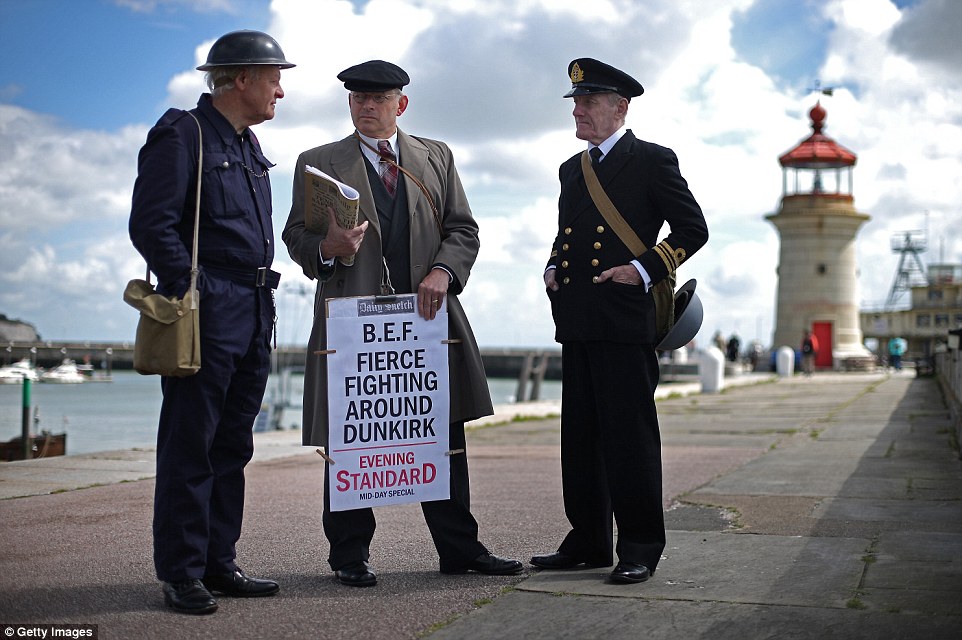
Heralding the news: Men dressed as a 1940's newspaper vendor, an air raid warden and a member of the Royal Navy in Ramsgate yesterday
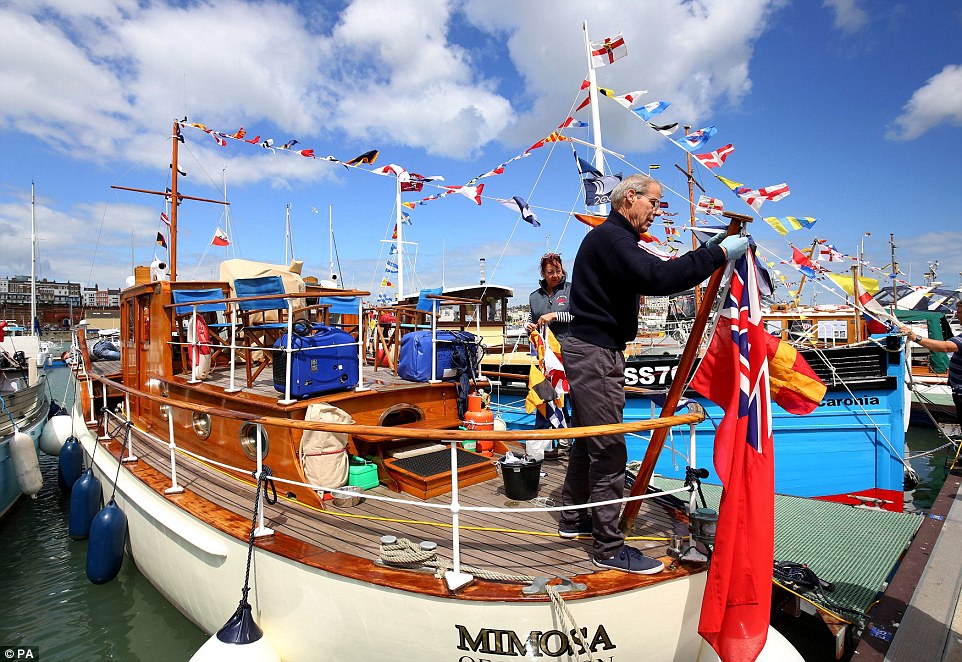
Bright: Jenni Britton and Paul Morris fix a flag on their boat, Mimosa, yesterday before joining others in the voyage across the Channel today
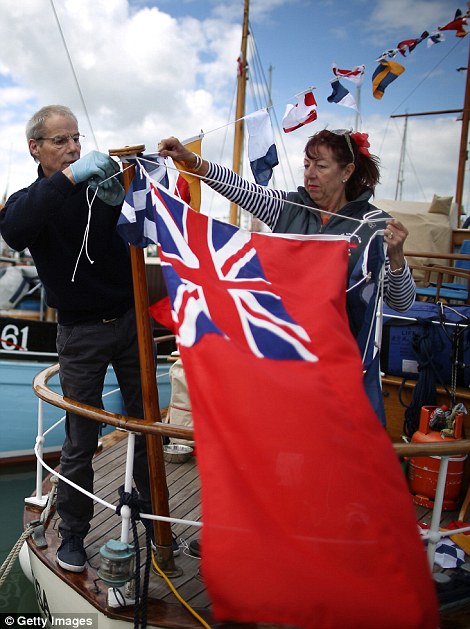
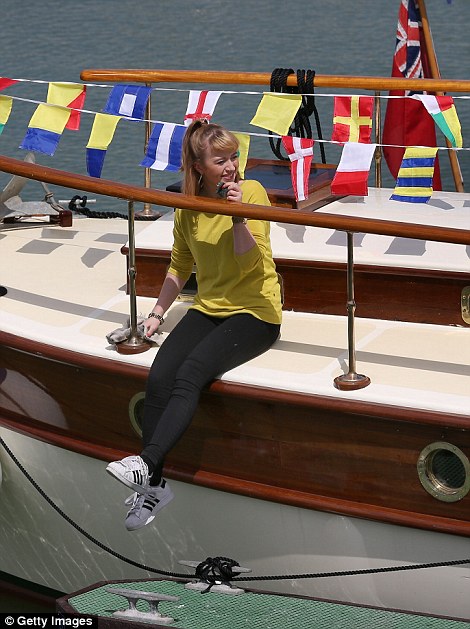
Final touches: Jenni Britton and Paul Morris on board the Mimosa yesterday (left) as a crew member cleans the brass on another vessel
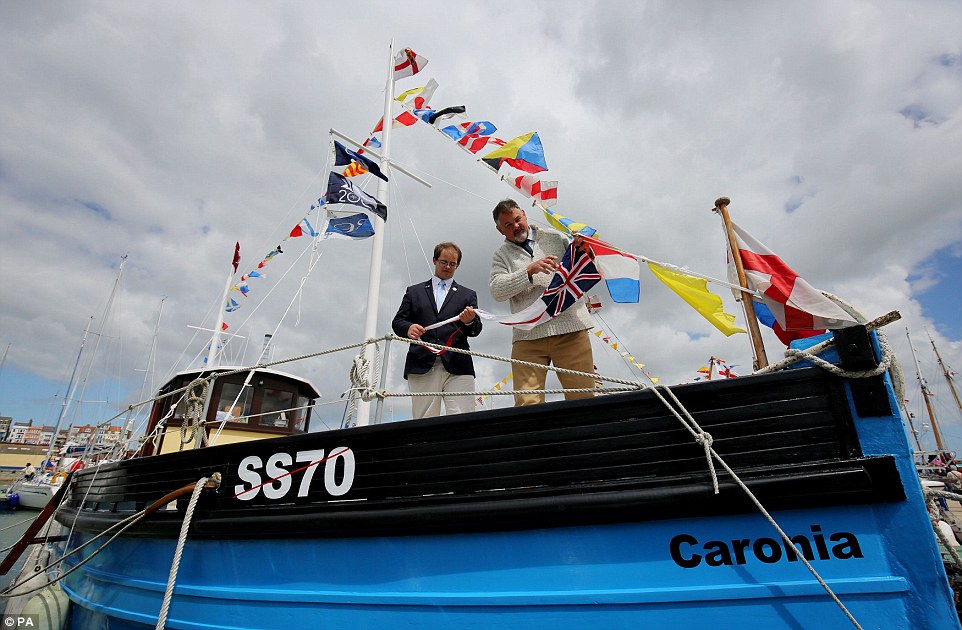
Peter Draper, right, and his son Lewis, tie flags on to their boat, the Caronia, yesterday. The fleet will be escorted by two Royal Navy vessels
There will also be an ADLS commemorative service on the quayside in Dunkirk next to the little ships themselves.
The commemorations began yesterday in Ramsgate with a church service to honour and remember the crews of the little ships.
At a second service in Ramsgate harbour the Bishop of Dover, Trevor Willmott, praised the ordinary people who manned the 'ramshackle fleet' and answered the call to 'serve and save' 75 years ago.
Speaking of today's Channel crossing, Ian Gilbert, commodore of the ADLS, said: 'It is not a re-enactment but a commemoration for those who fought and died and didn't return.'
Mr Gilbert said the 'immense success' of the evacuations was a major deterrent to Hitler and allowed for the backbone of the British army to return to fight in Italy, north Africa and Normandy later in the Second World War.
He said: 'The reason the anniversary commemorations are so important for us is that there are very, very few veterans left. In the not too distant future, these ships will be the only tangible link we have, as all the veterans will be gone.'
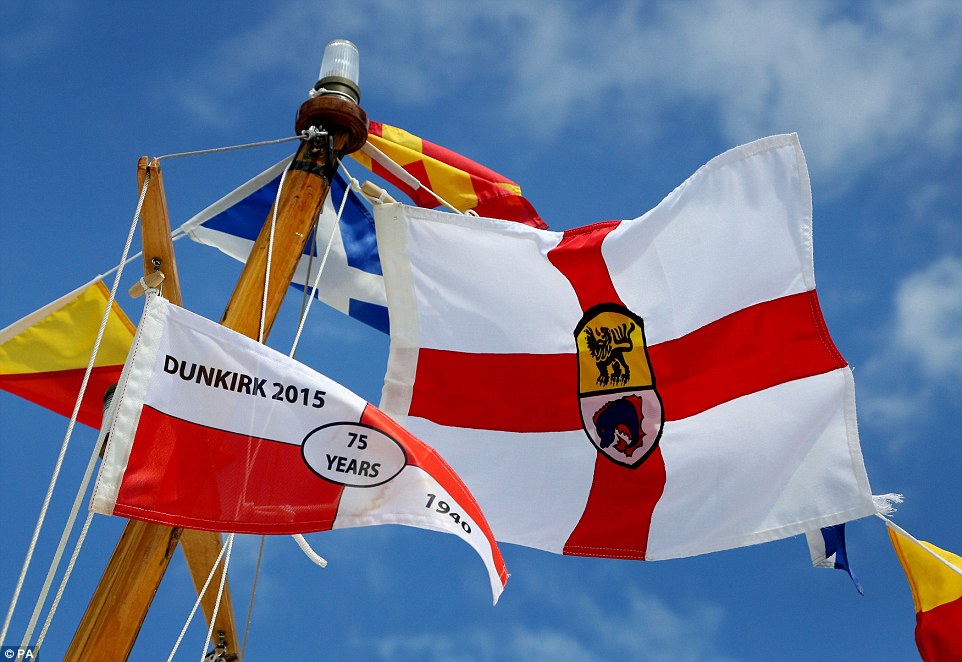
Proud: The Association of Dunkirk Little Ships Flag, left, and the Cross of St George, with the Arms of Dunkirk, flies above one of the ships. Only vessels which took part in the Dunkirk evacuation are allowed to fly these flags
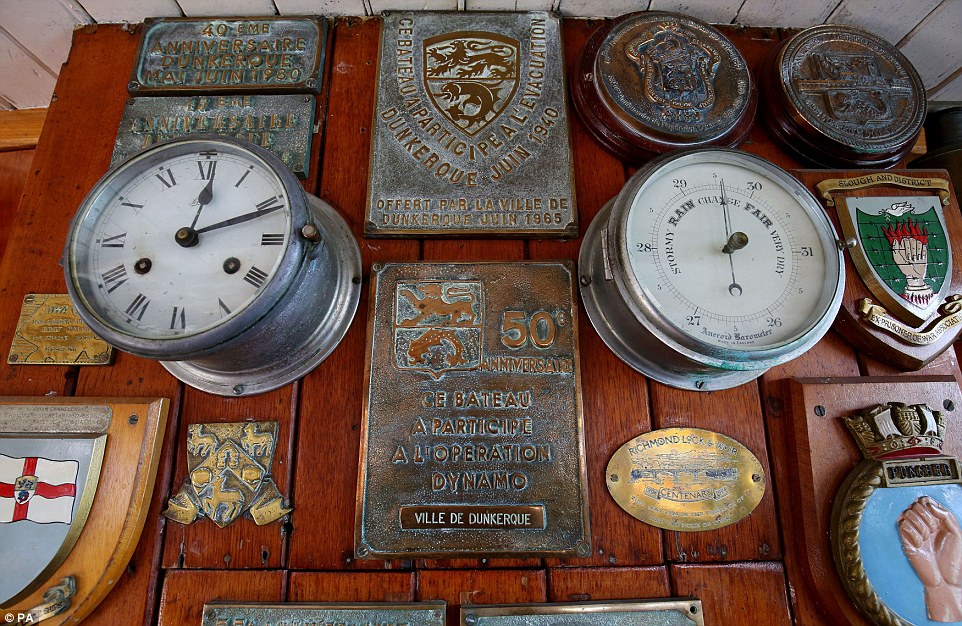
In memory: Plaques on board one of the ships display the dates of previous anniversary gatherings, held in 1990 and 1965, among others
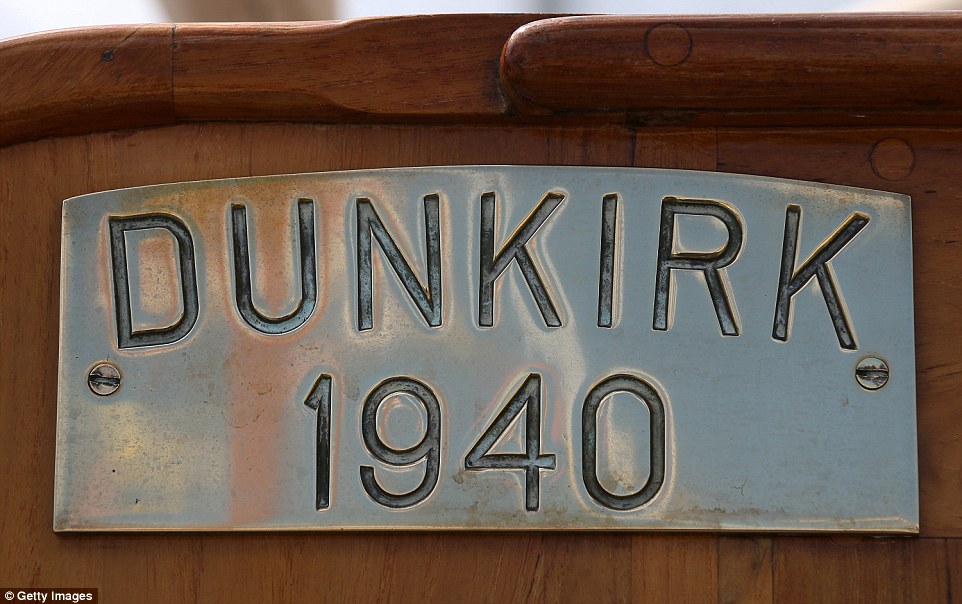
A brass plate denotes that this ship took part in the evacuation in 1940, dubbed Operation Dynamo
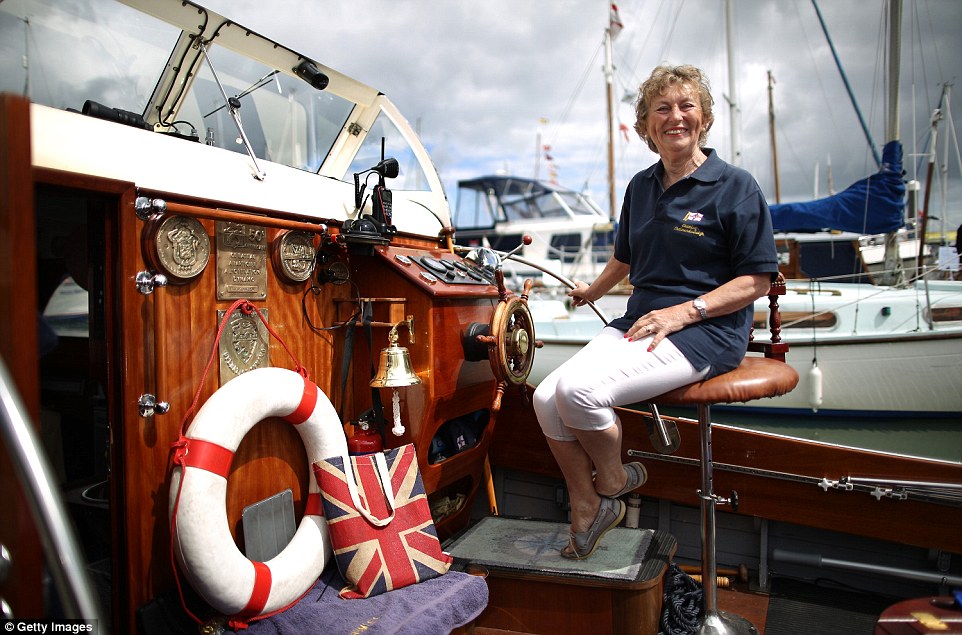
Patriotic: Sally Hamilton seen sitting on board her 'Little Ship' Chumley yesterday - her Union flag handbag resting on the bench by her feet

Two men wait on board one of the 'little ships', named Firefly. Theirs is one of dozens of boats voyaging across the Channel today
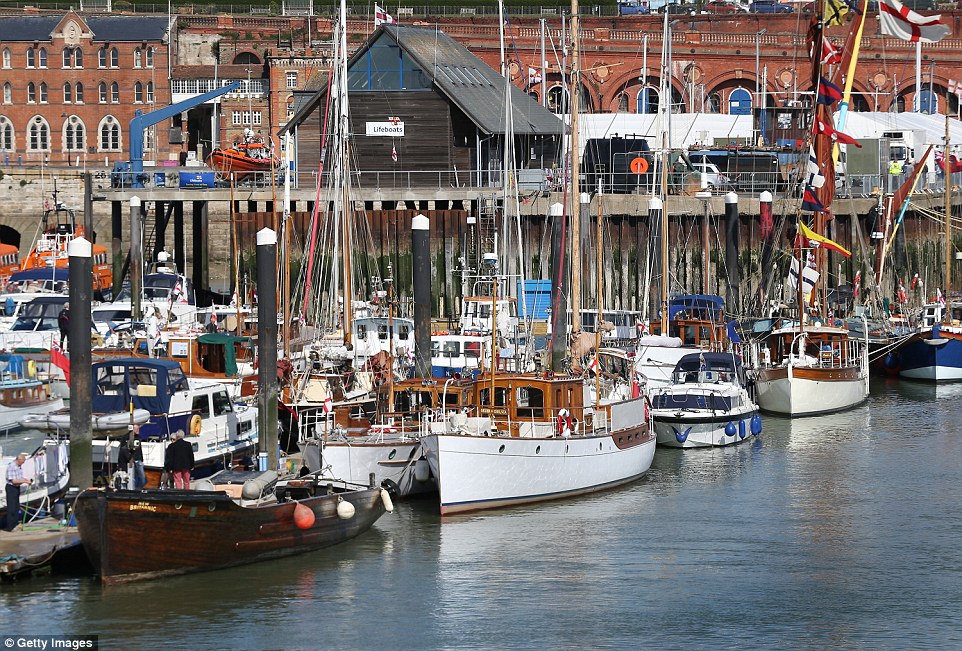
Ramshackle fleet: Fishing boats, yachts and lifeboats were pictured waiting in Kent before beginning their journey across the English Channel
From fishing boats to private yachts: How Britons rallied to evacuate Dunkirk
The evacuation from Dunkirk was one of the biggest operations of the Second World War and was one of the major factors in enabling the Allies to continue fighting.
More than 300,000 British, French and Belgian troops were saved, a move which played a key part in protecting Britain from a full-scale German invasion and allowed the soldiers to return to fight later in the war.
The Second World War began after Germany invaded Poland in 1939, but for a number of months there was little further action on land.
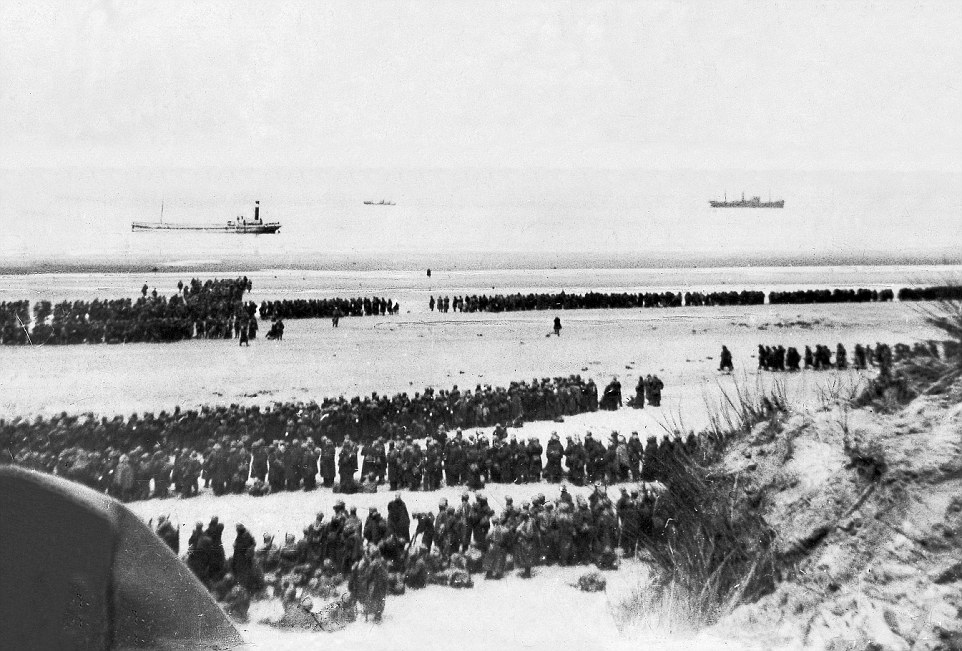
Troops wait in an orderly fashion on the beaches of Dunkirk for their turn to be rescued. In the distance, some of the ships sent to save them
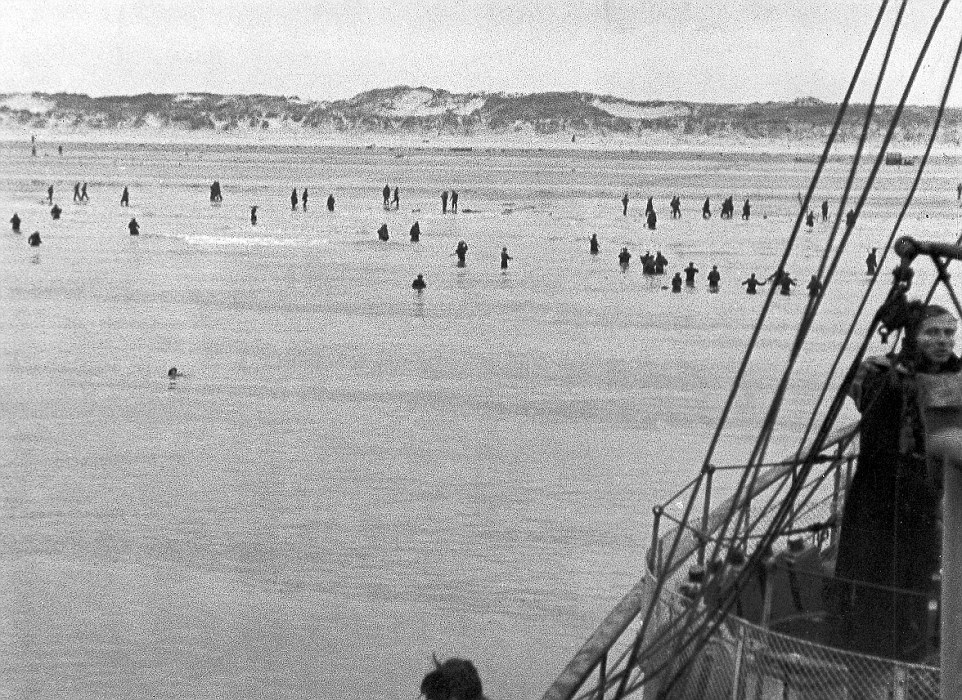 Men wade out from the beaches to ships waiting to take them back to Britain in an evacuation that lasted several days
Men wade out from the beaches to ships waiting to take them back to Britain in an evacuation that lasted several days
But in early 1940, Germany invaded Denmark and Norway and then launched an offensive against Belgium and France in western Europe.
Hitler's troops advanced rapidly, taking Paris - which they never achieved in the First World War - and moved towards the Channel.
They reached the coast towards the end of May 1940, pinning back the Allied forces, including several hundred thousand troops of the British Expeditionary Force. Military leaders quickly realised there was no way they would be able to stay on mainland Europe.
Jock Gardner, a naval historian at the Ministry of Defence, said they had few options available to them.
He said: 'There were two options. Leave them there, let them be over-run and put into captivity, or attempt to bring off as many as possible. The decision was made, and the only way to get them off sensibly was by sea.'
"The Admiralty have made an order requesting all owners of self-propelled pleasure craft between 30ft and 100ft in length to send all particulars to the Admiralty within 14 days from today if they have not already been offered or requisitioned"
BBC announcement on May 14, 1940
Operational command fell to Bertram Ramsay, a retired vice-admiral who was recalled to service in 1939.
From a room deep in the cliffs at Dover Castle, Ramsay and his staff pieced together Operation Dynamo, a daring rescue mission by the Royal Navy to get troops off the beaches around Dunkirk and back to Britain.
The evacuation itself used all sorts of forces.
Mr Gardner said: 'Nowadays people don't use the words "Dunkirk" without also thinking "little ships", but there was a lot more involved.'
The idea was that larger ships, such as naval destroyers and cross-channel ferries, would use the harbour at Dunkirk, where troops could embark with relative ease.
But this made it easy for the Germans to target them from the air, so it was decided that the harbour would not be the only focus and that some troops would leave from the beaches.
Mr Gardner said: 'The trouble with the beaches was that they couldn't get things like ferries in close. So instead they and the destroyers were moored off the beaches - but they had to get the soldiers from the beaches to them.
'They had a few boats but not many, so the decision was made to requisition all sorts of smaller boats which were capable of using the beaches.
'The idea was that these smaller boats - merchant vessels, sailing boats, yachts, barges and the like - would be used to take people off the beach to the offshore destroyers and ferries.'
On May 14 1940 the call went out.
The BBC made the announcement: 'The Admiralty have made an order requesting all owners of self-propelled pleasure craft between 30ft and 100ft in length to send all particulars to the Admiralty within 14 days from today if they have not already been offered or requisitioned.'
Boats of all sorts were requisitioned - from those for hire on the Thames to pleasure yachts - and manned by naval personnel, though in some cases boats were taken over to Dunkirk by the owners themselves.
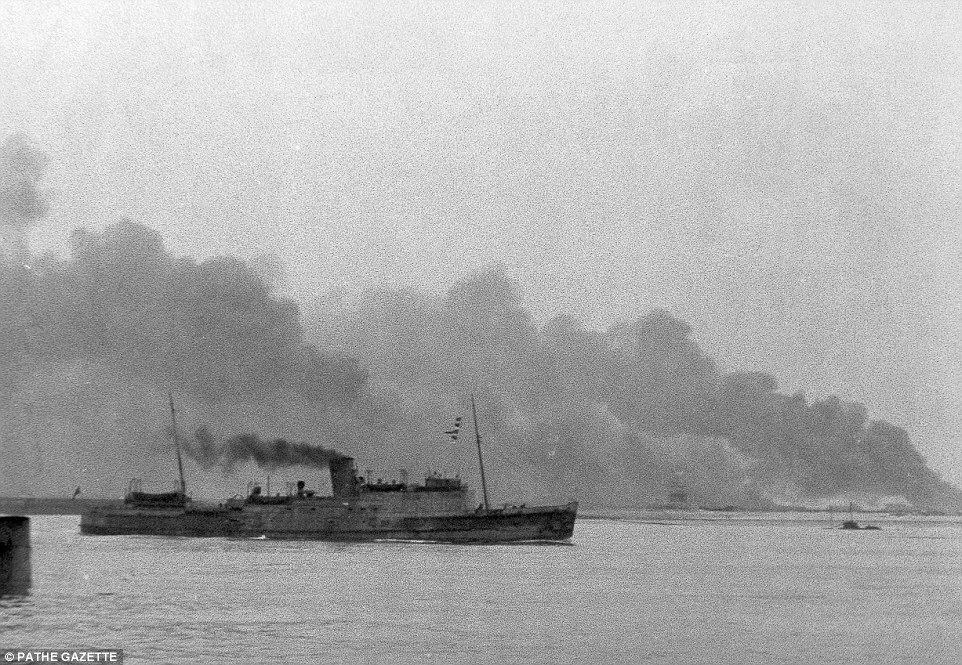
A ship with decks crammed full of soldiers - many of them only carrying rifles - sets off home for Britain as Dunkirk burns in the background
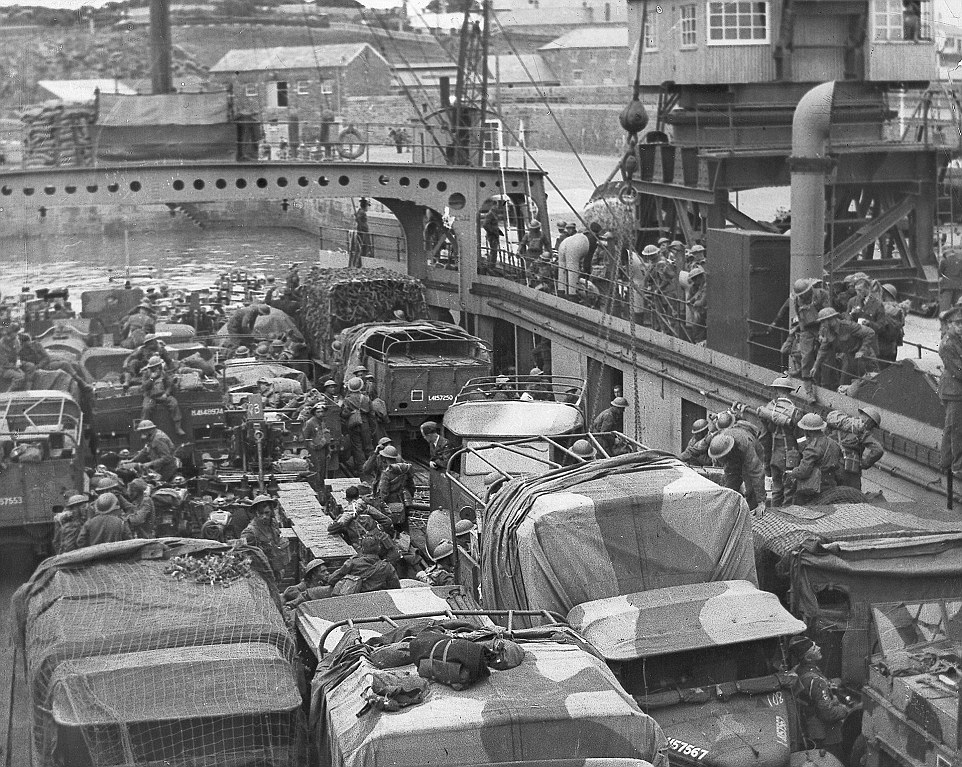
Some of the equipment rescued from Dunkirk is ferried back to Britain, but a number of aircraft, tanks and heavy guns, had to be left behind
By late May, more than 800 vessels of all shapes and sizes had assembled at ports all across southern England ready to evacuate the troops. Among them were around 500 'little ships' - including Firefly, a motor yacht of 26ft.
They sailed from Dover, the closest point, to allow them the shortest crossing. On May 29, Operation Dynamo was put into action.
Mr Gardner said: 'It was all done very quickly. The weather conditions were pretty good, which was good news but also bad as it made them vulnerable.
'It was a 24 hour operation, so they set out at any time during the day or night on a route of anything between 39 miles and 90 miles that would take seven to eight hours.
"We shall fight on the beaches, we shall fight on the landing grounds, we shall fight in the fields and in the streets, we shall fight in the hills. We shall never surrender!"
Sir Winston Churchill praising Dunkirk
'This was a time of pre-sophisticated navigational aids, so they would go with bigger ships to get them there. Men were going over in boats smaller than they were used to, open boats with no shelter.'
When they got to Dunkirk they faced chaos.
Soldiers were hiding in sand dunes from aerial attack, much of the town of Dunkirk had been reduced to ruins by the bombardment and the German forces were closing in.
Above them, RAF Spitfire and Hurricane fighters were headed inland to attack the German fighter planes to head them off and protect the men on the beaches.
As the little ships arrived they were directed to different sectors. Many did not have radios, so the only methods of communication were by shouting to those on the beaches or by semaphore.
Mr Gardner continued: 'The beaches of Dunkirk are fairly open, and the men would run down them and clamber on to the boats. They would let as many as possible on board, and the small boats would then ferry them out to something bigger offshore.'
Space was so tight, with decks crammed full, that soldiers could only carry their rifles. A huge amount of equipment, including aircraft, tanks and heavy guns, had to be left behind.
The little ships were meant to bring soldiers to the larger ships, but some ended up ferrying people all the way back to England. The evacuation lasted for several days.
Prime Minister Winston Churchill and his advisers had expected that it would be possible to rescue only 20,000 to 30,00 men, but by June 4 more than 300,000 had been saved.
The exact number was impossible to gauge - though 338,000 is an accepted estimate - but it is thought that over the week up to 400,000 British, French and Belgian troops were rescued - men who would return to fight in Europe and eventually help win the war.
But there were also heavy losses, with around 90,000 dead, wounded or taken prisoner.
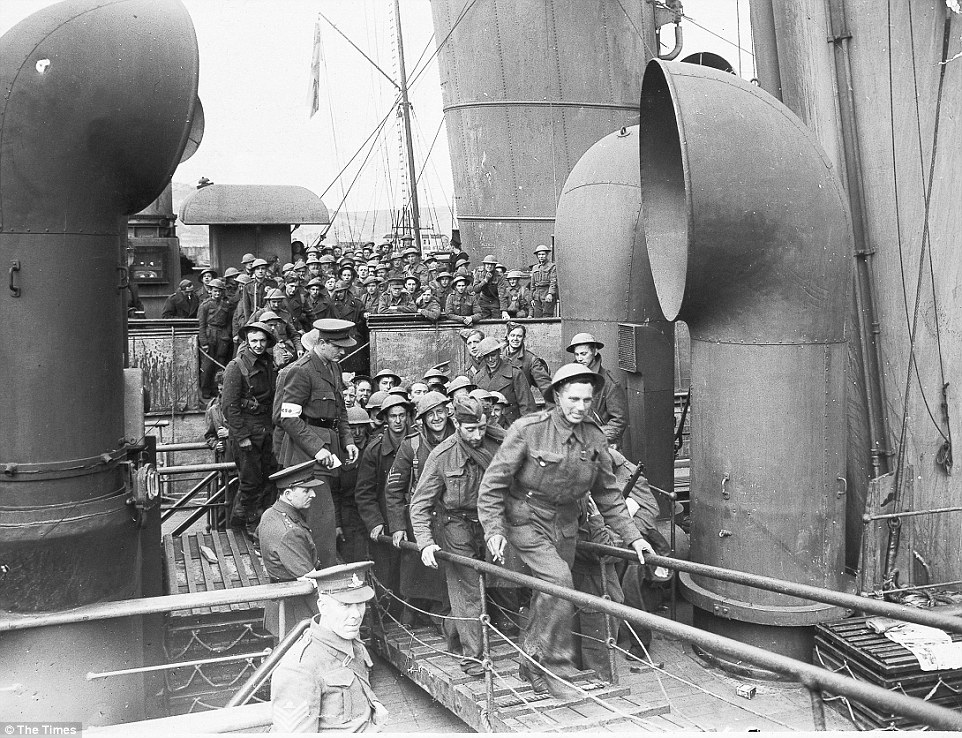
Faces filled with relief, troops from the British Expeditionary Force disembark at an English port on 31 May 1940 after escaping Dunkirk
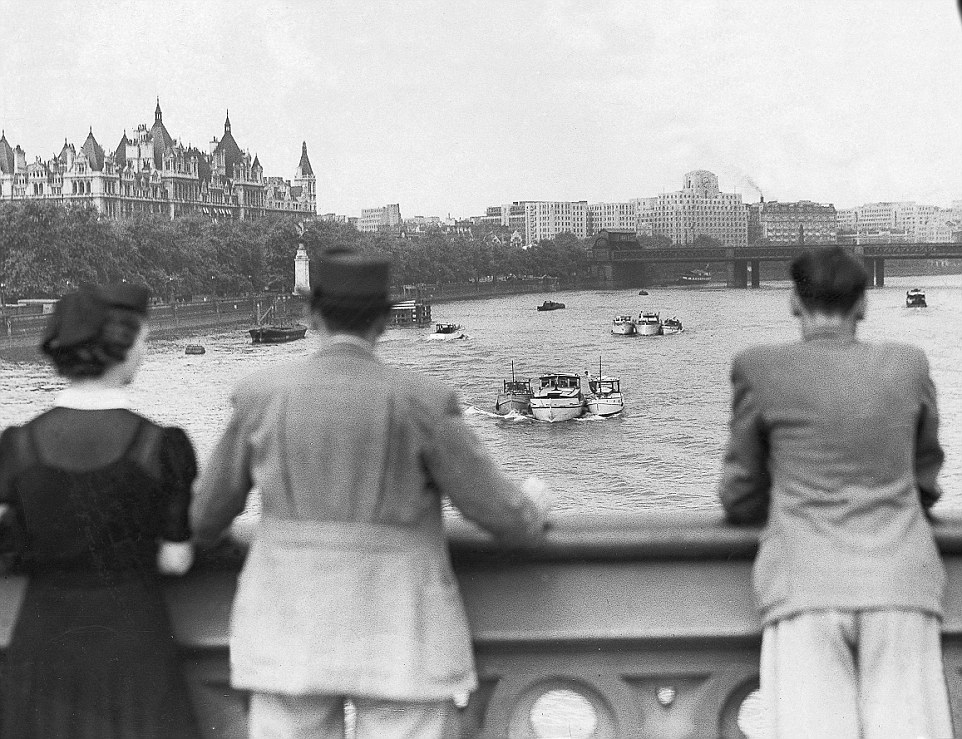
Some of the little ships that helped in the evacuation of Dunkirk are pictured heading up the Thames, returning to their berths
A number of ships were also lost, through enemy action, running aground and breaking down.
Despite this, Dunkirk was regarded as a success and a great boost for morale.
In a famous speech to the House of Commons, Churchill praised the 'miracle of Dunkirk' and resolved that Britain would fight on: 'We shall fight on the beaches, we shall fight on the landing grounds, we shall fight in the fields and in the streets, we shall fight in the hills. We shall never surrender!'
Mr Gardner said: 'No evacuation is a victory. However it was a totally successful evacuation. It saved a large number of troops who were able to fight again and were freed to protect the UK against invasion.
'In the context of being able to continue the Second World War, Dunkirk was a very important factor. If we had lost those troops, which could well have been the case, we would have been susceptible to invasion and would have had trouble fighting on.'
And the little ships of Dunkirk played no small part in helping that to happen.
Mr Gardner added: 'The small ships narrative has dominated the story of Dunkirk. They didn't do everything, but we couldn't have done without them.'
The ramshackle fleet of some 50 yachts, fishing boats and life boats have set sail from Ramsgate in Kent for the French port, recreating a journey that saw them save the lives of more than 300,000 British, French and Belgian troops.
Hundreds of well-wishers lined the harbour walls as the boats made their way out on to calm seas beyond the breakwater, whooping and cheering as those aboard waved back.
A piper played by the lighthouse as boats such as Aureol, L'Orage and Chumley - names that have gone down in history for the role they played in the operation - sailed out of the port. And standards were lowered as a mark of respect for those who did not return.
The return to Dunkirk: Flotilla of 50 'little ships' make journey from south coast to French port 75 years on from the evacuation that rescued 300,000 Allied troops
Fleet of 'little ships' that evacuated soldiers from Dunkirk in WWII are returning to France to mark 75th anniversary
Some 50 vessels set sail from Kent to recreate journey that saw them save more than 300,000 Allied lives
Veterans are among those crossing the Channel for commemorations of the mission, dubbed 'Operation Dynamo'
By Stephanie Linning for MailOnline
21 May 2015
Daily Mail

The 'little ships' are making the same journey from Ramsgate to Dunkirk as they made 75 years ago
A flotilla of 'little ships' that evacuated Allied troops from the beaches of Dunkirk set sail for France this morning to commemorate the 75th anniversary of the pivotal Second World War operation.
The ramshackle fleet of some 50 yachts, fishing boats and life boats have set sail from Ramsgate in Kent for the French port, recreating a journey that saw them save the lives of more than 300,000 British, French and Belgian troops.
Hundreds of well-wishers lined the harbour walls as the boats made their way out on to calm seas beyond the breakwater, whooping and cheering as those aboard waved back.
A piper played by the lighthouse as boats such as Aureol, L'Orage and Chumley - names that have gone down in history for the role they played in the operation - sailed out of the port. And standards were lowered as a mark of respect for those who did not return.


Setting sail: Hundreds of well-wishers gathered as a marching band paraded through the streets, and a piper played at the lighthouse


Support: A Spitfire and a Hurricane fighter plane performed a military fly-past, echoing the air support the RAF gave to her naval colleagues

Remembering their journey: Dunkirk veterans Michael Bentall, 94, (left) and 95-year-old Garth Wright enjoy a cuppa on board the Princess Freda

Send off: Members of the public watch and wave as the 'little ships' leave Ramsgate Harbour in Kent to set sail for Dunkirk, France

Commemoration: The fleet of 'little ships' set sail from Ramsgate in Kent for Dunkirk to mark the 75th anniversary of the evactuation
A Spitfire and a Hurricane fighter plane performed a military fly-past, a touching salute that echoed the air support the RAF gave to her naval colleagues as they desperately tried to rescue men from the beaches.
Aboard one little ship, the Thames passenger vessel Princess Freda, were Dunkirk veterans Garth Wright, 95, from Plymouth, and 94-year-old Michael Bentall, who came over from Canada for the anniversary. Mr Wright said he was impressed by the number of boats taking part in the event.
He said: 'This is a great occasion. They are making much more of it than I thought it was going to be. I have been back a number of times over the years, but I have never experienced the importance like this one is.
'I think it is the little ships that have contributed to the effect of it all. Seeing them all, it is an inspiring and thrilling sight.'
Around 10 other veterans are expected to attend a series of commemorative events at Dunkirk over the coming days.
RETRACING THEIR JOURNEY: TWO VETERANS, AGED 94 AND 95, RETURN TO DUNKIRK TO REMEMBER THE FALLEN
Two veterans of the Dunkirk evacuations will cross the Channel on the Princess Freda, a 63ft Thames passenger vessel that ferried soldiers off the beaches to a waiting navy destroyer.
Garth Wright, 95, from Plymouth, said he was impressed by the number of boats taking part in the event.
He said: 'This is a great occasion. They are making much more of it than I thought it was going to be. I have been back a number of times over the years, but I have never experienced the importance like this one is.
'I think it is the little ships that have contributed to the effect of it all. Seeing them all, it is an inspiring and thrilling sight.'

Mr Wright is taking the journey with 94-year-old Michael Bentall, who came over from Canada for the anniversary. Mr Bentall served with the 4th Battalion, Royal Berkshire Regiment, which was part of the British Expeditionary Force.
As the Germans advanced, he fled 120 miles towards the coast, reaching the beach somewhere between Dunkirk and La Panne.
He and his comrades found a rowing boat and headed out into the Channel, where they were eventually rescued and returned to safety in Sheerness, Kent, some time around June 4 1940.
Some 10 other veterans are expected to attend a series of commemorative events at Dunkirk over the coming days.

Scenic: Under clear skies, the little ships pass the White Cliffs of Dover as they make their way towards Dunkirk on the French coast


Well-wishers lined the harbour walls as the boats made their way out on to calm seas, whooping and cheering as those aboard waved back



Taking part: A re-enactor in period costume looks out over Ramsgate harbour, left, and sailor Alan Jackson looks out from his boat at dawn

The shadows of hundreds of people are seen on the shore as the fleet makes its way past the harbour walls in Ramsgate, Kent
Hundreds of vessels crossed the Channel between May 27 and June 4 1940, with fishing boats, pleasure yachts and lifeboats pressed into service to rescue soldiers who had been forced back to the coast in the face of the German advance across Europe.
The evacuation, known as Operation Dynamo, saw an estimated 338,000 troops rescued from northern France. Described as a 'miracle of deliverance' by wartime prime minister Winston Churchill, it is seen as one of several events in 1940 that determined the eventual outcome of the war.
The Association of Dunkirk Little Ships (ADLS) is being escorted across the Channel for the anniversary by the RNLI and the Royal Navy boats HMS Ranger and HMS Trumpeter - on board which is Prince Michael of Kent, the ADLS's honorary Admiral.

A Spitfire and a Hurricane fighter plane performed a military fly-past, a touching salute to the air support the RAF gave during the operation

The little ships are being escorted across the Channel by the RNLI and the Royal Navy boats HMS Ranger and HMS Trumpeter
Tomorrow there will be a service at the British Memorial at the Dunkirk Military Cemetery, followed by a reception and presentation for ADLS skippers at the Dunkirk town hall.
The main event to mark the historic rescue mission will be on Saturday, when an official service will take place at the Allied Beach Memorial. Later that day there will be a parade of military vehicles and bands through the streets of Dunkirk.
On Sunday a memorial plaque will be unveiled at the site of the MV Crested Eagle, a paddle steamer which was attacked and sank with 300 soldiers on board.

Paying tribute: Ted Oates, a veteran of the Dunkirk mission, is pictured in Ramsgate yesterday, when the commemoratory events began

Heralding the news: Men dressed as a 1940's newspaper vendor, an air raid warden and a member of the Royal Navy in Ramsgate yesterday

Bright: Jenni Britton and Paul Morris fix a flag on their boat, Mimosa, yesterday before joining others in the voyage across the Channel today


Final touches: Jenni Britton and Paul Morris on board the Mimosa yesterday (left) as a crew member cleans the brass on another vessel

Peter Draper, right, and his son Lewis, tie flags on to their boat, the Caronia, yesterday. The fleet will be escorted by two Royal Navy vessels
There will also be an ADLS commemorative service on the quayside in Dunkirk next to the little ships themselves.
The commemorations began yesterday in Ramsgate with a church service to honour and remember the crews of the little ships.
At a second service in Ramsgate harbour the Bishop of Dover, Trevor Willmott, praised the ordinary people who manned the 'ramshackle fleet' and answered the call to 'serve and save' 75 years ago.
Speaking of today's Channel crossing, Ian Gilbert, commodore of the ADLS, said: 'It is not a re-enactment but a commemoration for those who fought and died and didn't return.'
Mr Gilbert said the 'immense success' of the evacuations was a major deterrent to Hitler and allowed for the backbone of the British army to return to fight in Italy, north Africa and Normandy later in the Second World War.
He said: 'The reason the anniversary commemorations are so important for us is that there are very, very few veterans left. In the not too distant future, these ships will be the only tangible link we have, as all the veterans will be gone.'

Proud: The Association of Dunkirk Little Ships Flag, left, and the Cross of St George, with the Arms of Dunkirk, flies above one of the ships. Only vessels which took part in the Dunkirk evacuation are allowed to fly these flags

In memory: Plaques on board one of the ships display the dates of previous anniversary gatherings, held in 1990 and 1965, among others

A brass plate denotes that this ship took part in the evacuation in 1940, dubbed Operation Dynamo

Patriotic: Sally Hamilton seen sitting on board her 'Little Ship' Chumley yesterday - her Union flag handbag resting on the bench by her feet

Two men wait on board one of the 'little ships', named Firefly. Theirs is one of dozens of boats voyaging across the Channel today

Ramshackle fleet: Fishing boats, yachts and lifeboats were pictured waiting in Kent before beginning their journey across the English Channel
From fishing boats to private yachts: How Britons rallied to evacuate Dunkirk
The evacuation from Dunkirk was one of the biggest operations of the Second World War and was one of the major factors in enabling the Allies to continue fighting.
More than 300,000 British, French and Belgian troops were saved, a move which played a key part in protecting Britain from a full-scale German invasion and allowed the soldiers to return to fight later in the war.
The Second World War began after Germany invaded Poland in 1939, but for a number of months there was little further action on land.

Troops wait in an orderly fashion on the beaches of Dunkirk for their turn to be rescued. In the distance, some of the ships sent to save them

But in early 1940, Germany invaded Denmark and Norway and then launched an offensive against Belgium and France in western Europe.
Hitler's troops advanced rapidly, taking Paris - which they never achieved in the First World War - and moved towards the Channel.
They reached the coast towards the end of May 1940, pinning back the Allied forces, including several hundred thousand troops of the British Expeditionary Force. Military leaders quickly realised there was no way they would be able to stay on mainland Europe.
Jock Gardner, a naval historian at the Ministry of Defence, said they had few options available to them.
He said: 'There were two options. Leave them there, let them be over-run and put into captivity, or attempt to bring off as many as possible. The decision was made, and the only way to get them off sensibly was by sea.'
"The Admiralty have made an order requesting all owners of self-propelled pleasure craft between 30ft and 100ft in length to send all particulars to the Admiralty within 14 days from today if they have not already been offered or requisitioned"
BBC announcement on May 14, 1940
Operational command fell to Bertram Ramsay, a retired vice-admiral who was recalled to service in 1939.
From a room deep in the cliffs at Dover Castle, Ramsay and his staff pieced together Operation Dynamo, a daring rescue mission by the Royal Navy to get troops off the beaches around Dunkirk and back to Britain.
The evacuation itself used all sorts of forces.
Mr Gardner said: 'Nowadays people don't use the words "Dunkirk" without also thinking "little ships", but there was a lot more involved.'
The idea was that larger ships, such as naval destroyers and cross-channel ferries, would use the harbour at Dunkirk, where troops could embark with relative ease.
But this made it easy for the Germans to target them from the air, so it was decided that the harbour would not be the only focus and that some troops would leave from the beaches.
Mr Gardner said: 'The trouble with the beaches was that they couldn't get things like ferries in close. So instead they and the destroyers were moored off the beaches - but they had to get the soldiers from the beaches to them.
'They had a few boats but not many, so the decision was made to requisition all sorts of smaller boats which were capable of using the beaches.
'The idea was that these smaller boats - merchant vessels, sailing boats, yachts, barges and the like - would be used to take people off the beach to the offshore destroyers and ferries.'
On May 14 1940 the call went out.
The BBC made the announcement: 'The Admiralty have made an order requesting all owners of self-propelled pleasure craft between 30ft and 100ft in length to send all particulars to the Admiralty within 14 days from today if they have not already been offered or requisitioned.'
Boats of all sorts were requisitioned - from those for hire on the Thames to pleasure yachts - and manned by naval personnel, though in some cases boats were taken over to Dunkirk by the owners themselves.

A ship with decks crammed full of soldiers - many of them only carrying rifles - sets off home for Britain as Dunkirk burns in the background

Some of the equipment rescued from Dunkirk is ferried back to Britain, but a number of aircraft, tanks and heavy guns, had to be left behind
By late May, more than 800 vessels of all shapes and sizes had assembled at ports all across southern England ready to evacuate the troops. Among them were around 500 'little ships' - including Firefly, a motor yacht of 26ft.
They sailed from Dover, the closest point, to allow them the shortest crossing. On May 29, Operation Dynamo was put into action.
Mr Gardner said: 'It was all done very quickly. The weather conditions were pretty good, which was good news but also bad as it made them vulnerable.
'It was a 24 hour operation, so they set out at any time during the day or night on a route of anything between 39 miles and 90 miles that would take seven to eight hours.
"We shall fight on the beaches, we shall fight on the landing grounds, we shall fight in the fields and in the streets, we shall fight in the hills. We shall never surrender!"
Sir Winston Churchill praising Dunkirk
'This was a time of pre-sophisticated navigational aids, so they would go with bigger ships to get them there. Men were going over in boats smaller than they were used to, open boats with no shelter.'
When they got to Dunkirk they faced chaos.
Soldiers were hiding in sand dunes from aerial attack, much of the town of Dunkirk had been reduced to ruins by the bombardment and the German forces were closing in.
Above them, RAF Spitfire and Hurricane fighters were headed inland to attack the German fighter planes to head them off and protect the men on the beaches.
As the little ships arrived they were directed to different sectors. Many did not have radios, so the only methods of communication were by shouting to those on the beaches or by semaphore.
Mr Gardner continued: 'The beaches of Dunkirk are fairly open, and the men would run down them and clamber on to the boats. They would let as many as possible on board, and the small boats would then ferry them out to something bigger offshore.'
Space was so tight, with decks crammed full, that soldiers could only carry their rifles. A huge amount of equipment, including aircraft, tanks and heavy guns, had to be left behind.
The little ships were meant to bring soldiers to the larger ships, but some ended up ferrying people all the way back to England. The evacuation lasted for several days.
Prime Minister Winston Churchill and his advisers had expected that it would be possible to rescue only 20,000 to 30,00 men, but by June 4 more than 300,000 had been saved.
The exact number was impossible to gauge - though 338,000 is an accepted estimate - but it is thought that over the week up to 400,000 British, French and Belgian troops were rescued - men who would return to fight in Europe and eventually help win the war.
But there were also heavy losses, with around 90,000 dead, wounded or taken prisoner.

Faces filled with relief, troops from the British Expeditionary Force disembark at an English port on 31 May 1940 after escaping Dunkirk

Some of the little ships that helped in the evacuation of Dunkirk are pictured heading up the Thames, returning to their berths
A number of ships were also lost, through enemy action, running aground and breaking down.
Despite this, Dunkirk was regarded as a success and a great boost for morale.
In a famous speech to the House of Commons, Churchill praised the 'miracle of Dunkirk' and resolved that Britain would fight on: 'We shall fight on the beaches, we shall fight on the landing grounds, we shall fight in the fields and in the streets, we shall fight in the hills. We shall never surrender!'
Mr Gardner said: 'No evacuation is a victory. However it was a totally successful evacuation. It saved a large number of troops who were able to fight again and were freed to protect the UK against invasion.
'In the context of being able to continue the Second World War, Dunkirk was a very important factor. If we had lost those troops, which could well have been the case, we would have been susceptible to invasion and would have had trouble fighting on.'
And the little ships of Dunkirk played no small part in helping that to happen.
Mr Gardner added: 'The small ships narrative has dominated the story of Dunkirk. They didn't do everything, but we couldn't have done without them.'
Last edited: